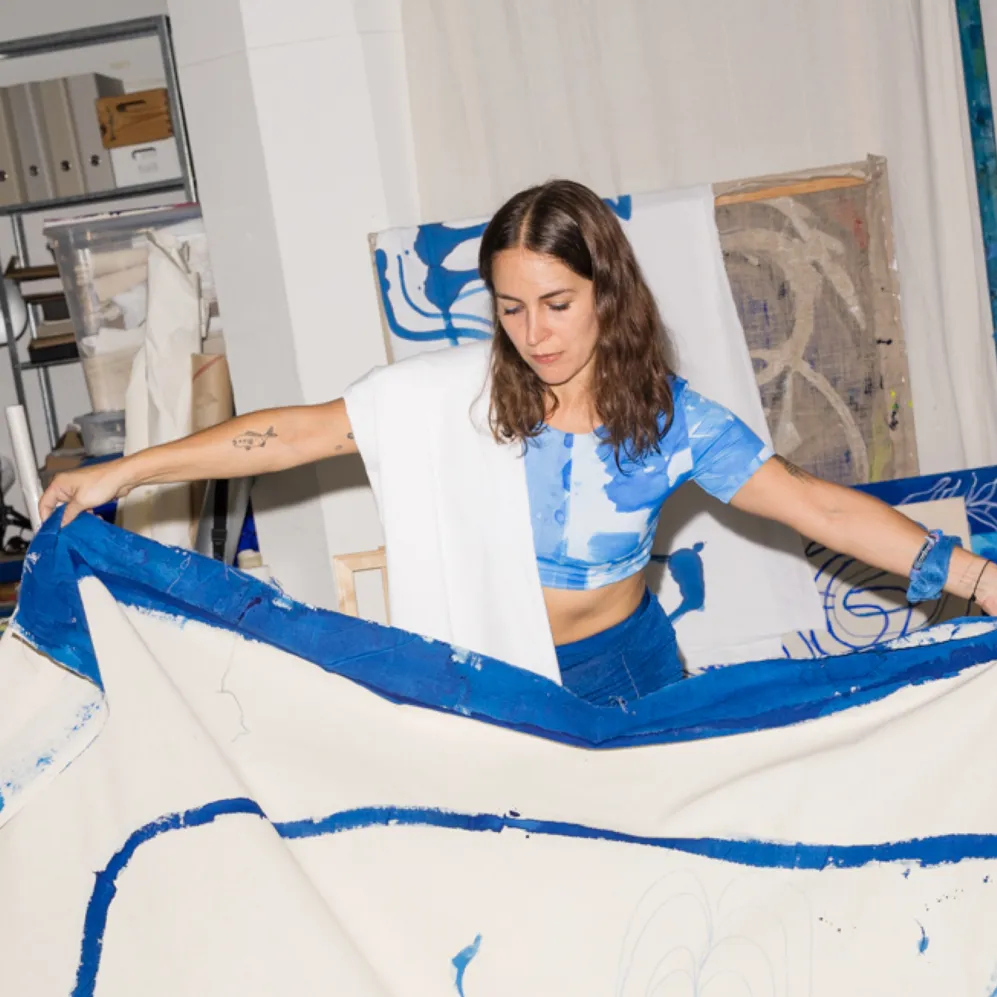
Words Vidula KotianDate 18 November 2024
Known for her immersive installations built from colorful painted textiles and ritual objects, she explores new realms of spirituality, care, and the healing power of art. One highlight was her Hygiea’s Cave: Temple of Collective Regeneration at the Bochum Art Museum, which ran from November 2023 to April 2024—a 130 square meter space for collective self-care, meditation, and connection. Irene’s art is playful yet deeply personal, inspired by grief, movement, and her fascination with blue, inviting you to reconnect, reflect, and find joy in the present moment.
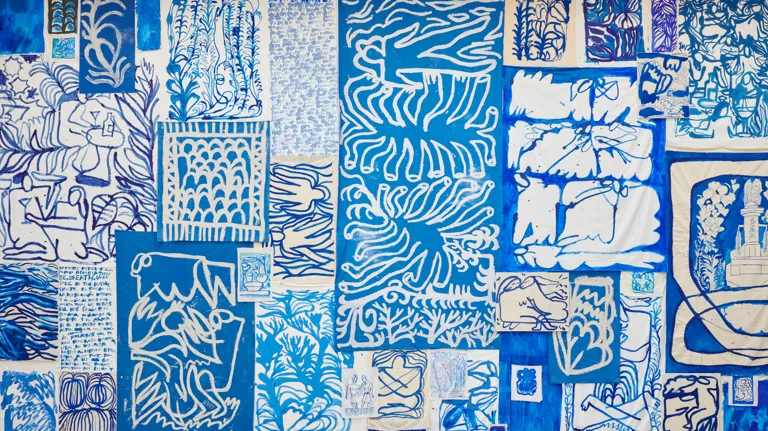
“Our House is a Very, Very Fine House” wall installation created for Kunstmuseum Bochum’s 40th anniversary group exhibition
I’ve been drawing since I was a kid. I planned to study art at university but chose journalism, thinking it might be more financially stable. At 18, I left my hometown for Germany, only to find that pursuing journalism in a foreign language came with its own set of challenges. So, I returned to drawing, studying visual communication and design. After an Erasmus stint in Portugal, I shifted my focus to installation art and transitioned to Fine Art studies. An important moment in my practice, I suppose, was when I later traveled to Brazil to explore and conduct research on spirituality in art.
I think I must have been a tree in Brazil in a past life; I’ve been drawn to it since I was a teenager. I collected Brazilian vinyls and always dreamed of visiting. When I turned 30, my friends helped make that dream a reality, gifting me funds for the trip. In 2018, I spent three or four months there.
That same year, I began exploring installation art after losing one of my best friends. It was a turning point where my life and art became inseparable. I created altars for her and for myself. I sought to decolonize my spirituality, moving beyond the influences of Catholicism, yogic practices, and Brazilian traditions, making it more personal and rooted. Now, art is my sanctuary, my spirituality, and a deeply personal, yet intense, part of my life.
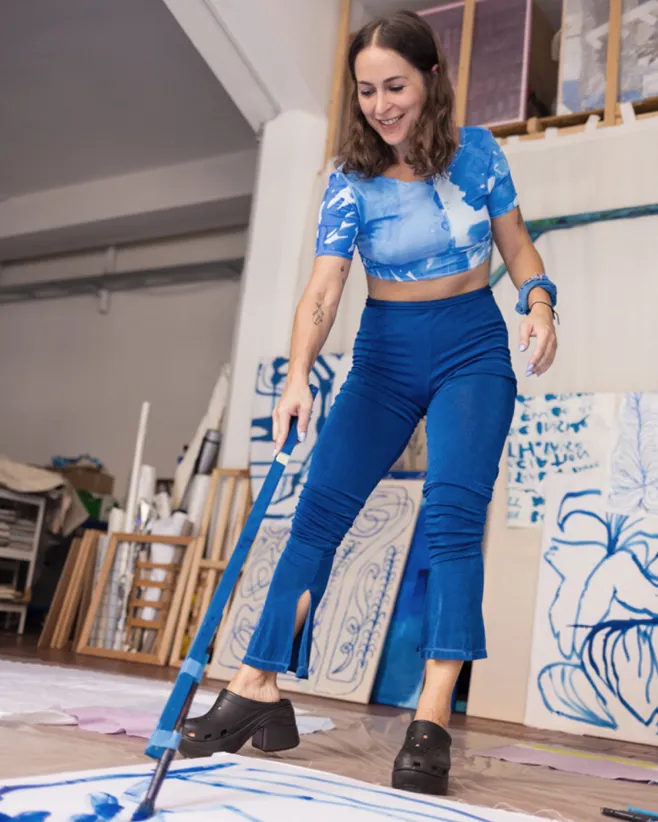
Irene Fernández Arcas
Art-making and experiencing art can be incredibly healing, but creativity isn’t limited to artists. It’s in the way you brush your teeth, cook, or approach life with a positive spirit. Keeping creativity alive improves our quality of life, but we often forget it, held back by self-doubt. In my workshops, I encourage people to let go of that fear—if you have a hand, you can draw; if you have a voice, you can sing. Drawing is healing and liberating, but any act of creativity, even reconnecting with your body, is a powerful source of wellness.
We live too fast, consuming everything—including art—at a rushed pace. My installations are designed to slow people down, offering moments of rest and reconnection with themselves. My first one in 2019 invited people to enter, even lie down, to experience art at their own pace.
Europe lacks regeneration architecture, akin to the ancient Greek healing temples. Inspired by that, I created Hygeia’s Cave, an installation designed as a collective napping space, featuring a kilometer of painted textiles, pillows, soundscapes, and projections. The vernissage unfolded as a 12-hour performance of breathing, resting, spontaneous art, and conversation. Spending a full day surrounded by blue, I understood the healing power of color.
Kids and elders seemed to understand my art intuitively, which makes me happy. Though my work is backed by research and theory, I aim for it to be playful and accessible—because art shouldn’t be elitist.
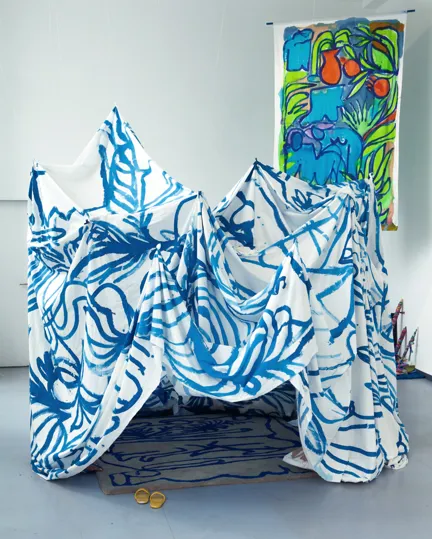
Inner Jungle solo exhibition for Galerie Wedding
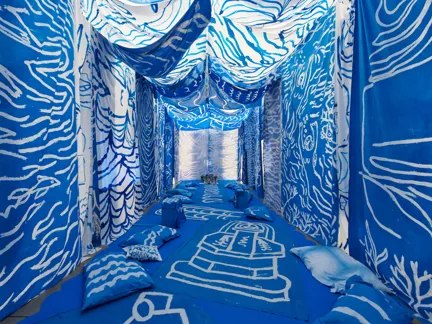
Hygeia’s Cave, an immersive installation featuring 550 meters of paintings, blueprints, pillows, video, sound, and more
During my studies, I worked at lot with cyanotype, a form of photography developed using sunlight. I have synesthesia. I experience colors emotionally, and blue became a cure and obsession—a powerful, healing, and nostalgic shade connected to home, the ocean, and the sky. Over time, it became my signature, something people now associate with me. Bluets by Maggie Nelson deeply resonated with me; she describes blue as an intuitive, almost inexplicable love. To me, blue is also a feminine color, tied to goddesses and the queens of ancient Egypt.
I often wear blue from head to toe, and it’s amazing how something so simple can make people happy—I seem to turn heads, even on a grocery run. It reminds me that art, like personal expression, should feel approachable and inspiring, not elitist. I want my art to give off that same energy, encouraging others to think, “This is cool, I could try that too.”
The process of making art is meditative, and I try to share that experience through my installations. As I mentioned before, there came a point when my art and life became inseparable, and I need meditation to stay balanced. I’m a huge enthusiast—when I love something, I want everyone to try it. Last year, I collaborated with NGBK Art on the Underground to create a piece titled Exploring Care in Public Spaces at Berlin's Kottbusser Tor station: a meditation for the train. Big billboards with QR codes led to a 25-minute meditation, translated into 10 languages. It’s still online, and the idea is to use daily moments, like a metro ride, to reconnect with yourself instead of spiraling into negative thoughts.
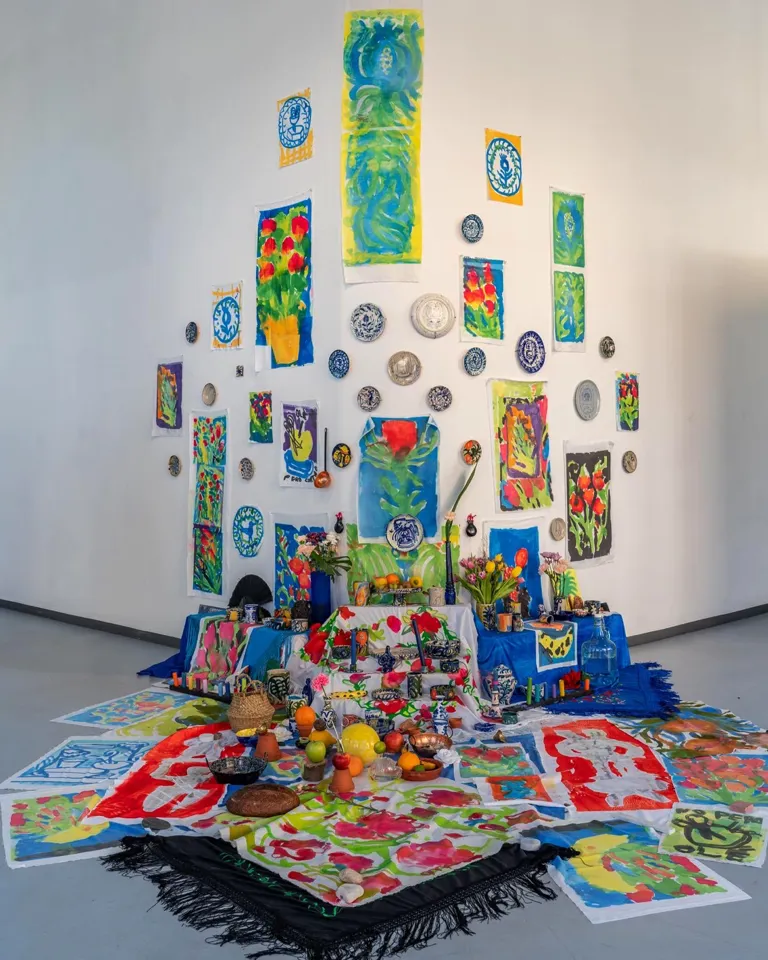
A La Alegria installation inspired by an ancient Andalusian celebration of spring
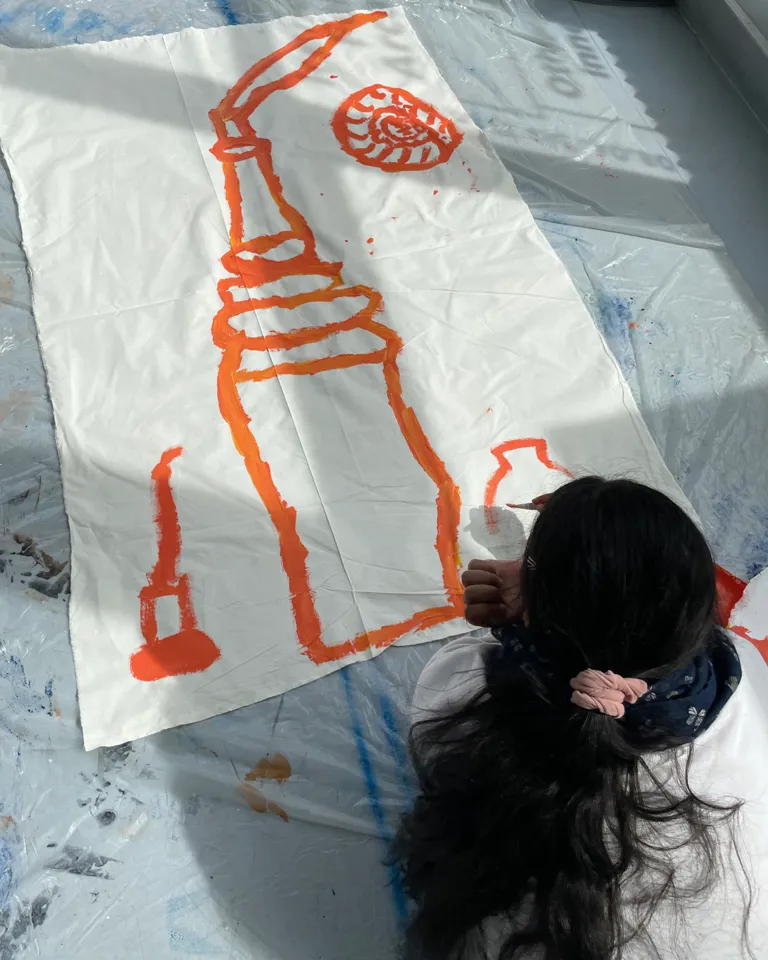
A workshop with children at Galerie Wedding
It was a visualization for your inner forest, which later evolved into an inner oceanic forest. The idea was to create an artwork in people’s minds—a mental space of regeneration. This concept came to me before Bochum, before I even knew what direction I wanted to take. Years ago, a creative feminist writing workshop in Berlin, inspired by Virginia Woolf's A Room of One’s Own, introduced the idea of a personal mental sanctuary, a retreat you can always visit. My work has continually explored this theme, from Inner Jungle and Inner Forest at Galerie Wedding to the more recent Inner Oceanic Forest.
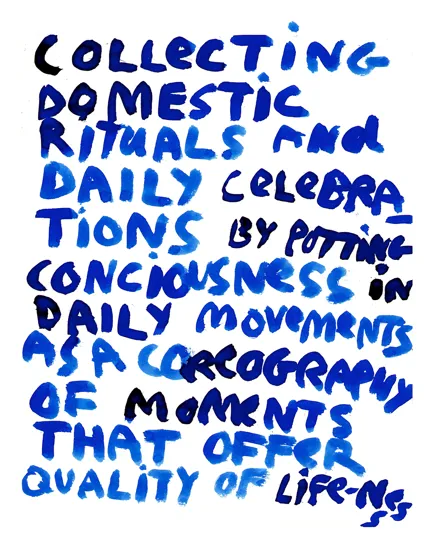
A collaborative care performance at Kühlhaus, Berlin
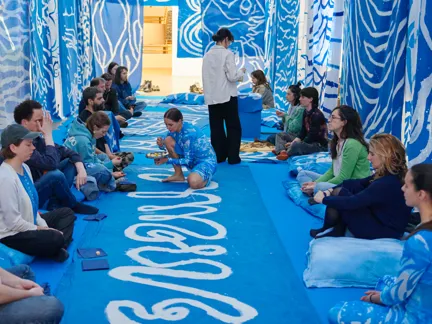
A collective performance and food meditation. Image by Sebastian Eggler
Irene Fernández Arcas
I wish I had a set routine, but I do follow some key practices. In the morning, I wash my face, brush my teeth, and practice gratitude. Then I do breathwork, meditation, or sometimes yoga, ranging from 10 minutes to two hours. I’m training to become a yoga teacher, so I practice almost every day. I put on music, turn on my sun lamp, and journal with a specially made coffee—coffee is a ritual for me. Only then do I turn on my phone to limit screen time. I also stay active with sports and sauna sessions with friends, and I work on making space to just do nothing, which is still a challenge.
Blue! I once acted in a friend’s movie, where she asked us to play ourselves—her strength as a filmmaker. I showed up at the hotel with three suitcases packed with blue stuff. First thing, I played ocean sounds and filled the room with blue, instantly happy.
I also have a thing for hotel rooms; the residencies I’ve done have been amazing. And libraries? I only pull out blue books, and people definitely think I’m a little crazy!

Pick up a blue book from ’She Said’, a space spotlighting queer and female authors—grab a coffee while you’re there.
Take your new read to a sauna. It’s a perfect way to unwind and dive into authors like Octavia Butler or Fernanda Melchor.
Go on a gallery tour! Check out Galerie Thomas Schulte, PSM Gallery, and don’t miss my group show, ’Historical Children: Lullabies from Wounds to Wonder’ at Savvy Contemporary, complete with linked activities.
Blue temple images Sebastian Eggler and Daniel Sadrowski
Portrait images Sven Serkis and Juan Saez